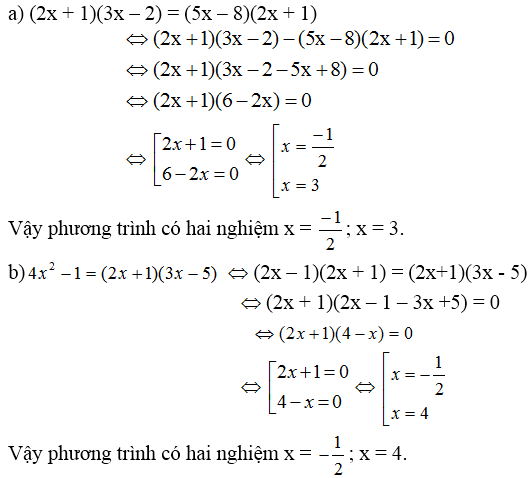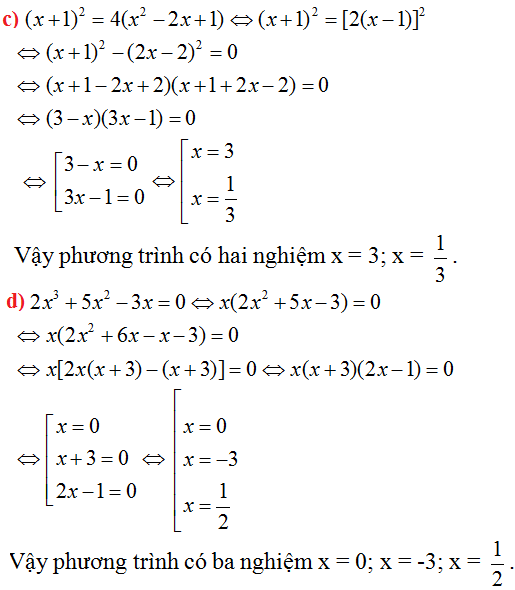
Hãy nhập câu hỏi của bạn vào đây, nếu là tài khoản VIP, bạn sẽ được ưu tiên trả lời.


a)(2x+1)(3x-2)=(5x-8)(2x+1)
⇔(2x+1)(3x-2)-(5x-8)(2x+1)=0
⇔(2x+1)(3x-2-5x+8)=0
⇔(2x+1)(-2x+6)=0
⇔2x+1=0 hoặc -2x+6=0
1.2x+1=0⇔2x=-1⇔x=-1/2
2.-2x+6=0⇔-2x=-6⇔x=3
phương trình có 2 nghiệm x=-1/2 và x=3

\(\frac{\left(3x+1\right)\left(3x-2\right)}{3}+5\left(3x+1\right)=\frac{2\left(2x+1\right)\left(3x+1\right)}{3}+2\left(3x+1\right)\)
\(\Leftrightarrow\frac{2\left(2x+1\right)\left(3x+1\right)-\left(3x+1\right)\left(3x-2\right)}{3}-3\left(3x+1\right)=0\)
\(\Leftrightarrow\frac{\left(4x+2\right)\left(3x+1\right)-\left(3x+1\right)\left(3x-2\right)}{3}-3\left(3x+1\right)=0\)
\(\Leftrightarrow\frac{12x^2+10x+2-9x^2+6x-3x+2}{3}-9x-3=0\)
\(\Leftrightarrow\frac{3x^2+13x+4-27x-9}{3}=0\Leftrightarrow\frac{3x^2-14x-5}{3}=0\)
\(\Leftrightarrow3x^2-14x-5=0\Leftrightarrow3x^2-14x=5\Leftrightarrow x\left(3x-14\right)=5\)
\(.................\)
v: Làm tiếp nè
3x^2 - 14x - 5 = 0
<=> 3x^2 - 15x + x - 5 = 0
<=> ....

\(\left(x-5\right)\left(x-1\right)=2x\left(x-1\right)\)
\(\Leftrightarrow\left(x-1\right)\left(x-5-2x\right)=0\)
\(\Leftrightarrow\left(x-1\right)\left(x+5\right)=0\)
\(\Leftrightarrow\orbr{\begin{cases}x=1\\x=-5\end{cases}}\)
Vậy............
\(5\left(x+3\right)\left(x-2\right)-3\left(x+5\right)\left(x+2\right)=0\)
\(\Leftrightarrow5\left(x^2+x-6\right)-3\left(x^2+7x+10\right)=0\)
\(\Leftrightarrow2x^2-16x-60=0\)
\(\Leftrightarrow x^2-8x-30=0\)
làm tiếp nhé!!!!!

a) 0,75x(x + 5) = (x + 5)(3 - 1,25x)
<=> 0,75x(x + 5) - (x + 5)(3 - 1,25x) = (x + 5)(3 - 1,25x) - (x + 5)(3 - 1,25x)
<=> 0,75x(x + 5) - (x + 5)(3 - 1,25x) = 0
<=> (x + 5)(0,75 + 1,25x - 3) = 0
<=> (x + 5)(2x - 3) = 0
<=> x + 5 = 0 hoặc 2x - 3 = 0
<=> x = -5 hoặc x = 3/2
b) 4/5 - 3 = 1/5x(4x - 15)
<=> -11/5 = x(4x - 15)/5
<=> -11 = x(4x - 15)
<=> -11 = 4x2 - 15x
<=> 11 + 4x2 - 15x = 0
<=> 4x2 - 4x - 11x + 11 = 0
<=> 4x(x - 1) - 11(x - 1) = 0
<=> (4x - 11)(x - 1) = 0
<=> 4x - 11 = 0 hoặc x - 1 = 0
<=> x = 11/4 hoặc x = 1
c) \(\left(x-3\right)-\frac{\left(x-3\right)\left(2x-5\right)}{6}=\frac{\left(x-3\right)\left(3-x\right)}{4}\)
<=> 12x - 36 - 2(x - 3)(2x - 5) = 3(x - 3)(3 - x)
<=> 12x - 36 - 4x2 + 10x + 12x - 30 = 9x - 3x2 - 27 + 9x
<=> 34x - 66 - 4x2 = 18x - 3x2 - 27
<=> 34x - 66 - 4x2 - 18x + 3x2 + 27 = 0
<=> 16x - 39x - x2 = 0
<=> x2 - 16x + 39x = 0
<=> (x - 3)(x - 13) = 0
<=> x - 3 = 0 hoặc x - 13 = 0
<=> x = 3 hoặc x = 13
d) \(\frac{\left(3x+1\right)\left(3x-2\right)}{3}+5\left(3x+1\right)=\frac{2\left(2x+1\right)\left(3x+1\right)}{3}+2x\left(3x+1\right)\)
<=> (3x + 1)(3x - 2) + 15(3x + 1) = 2(2x + 1)(3x + 1) + 6x(3x + 1)
<=> 9x2 - 6x + 3x - 2 + 45x + 15 = 12x3 + 4x + 6x + 2 + 18x2 + 6x
<=> 9x2 + 42x + 13 = 30x2 + 16x + 2
<=> 9x2 + 42x + 13 - 30x2 - 16x - 2 = 0
<=> -21x2 + 26x + 11 = 0
<=> 21x2 - 26x - 11 = 0
<=> 21x2 + 7x - 33x - 11 = 0
<=> 7x(3x + 1) - 11(3x + 1) = 0
<=> (7x - 11)(3x + 1) = 0
<=> 7x - 11 = 0 hoặc 3x + 1 = 0
<=> x = 11/7 hoặc x = -1/3

a) \(9x^2-1=\left(3x+1\right)\left(2x-1\right)\)
\(\Rightarrow\left(3x+1\right)\left(3x-1\right)=\left(3x+1\right)\left(2x-1\right)\)
\(\Leftrightarrow\left(3x+1\right)\left(3x-1\right)-\left(3x+1\right)\left(2x-1\right)=0\)
\(\Leftrightarrow\left(3x+1\right)\left(3x-1-2x+1\right)=0\)
\(\Leftrightarrow x\left(3x+1\right)=0\)
\(\Leftrightarrow\orbr{\begin{cases}x=0\\3x+1=0\end{cases}}\Leftrightarrow\orbr{\begin{cases}x=0\\x=\frac{-1}{3}\end{cases}}\)
b) \(\left(4x-3\right)^2=4\left(x^2-2x+1\right)\)
\(\Leftrightarrow16x^2-24x+9=4x^2-8x+4\)
\(\Leftrightarrow12x^2-16x+5=0\)
Ta có \(\Delta=16^2-4.12.5=16,\sqrt{\Delta}=4\)
\(\Rightarrow\orbr{\begin{cases}x=\frac{16+4}{12}=\frac{5}{3}\\x=\frac{16-4}{12}=1\end{cases}}\)

a) <=> \(6x^2-5x+3-2x+3x\left(3-2x\right)=0\)
<=> \(6x^2-5x+3-2x+9x-6x^2=0\)
<=> \(2x+3=0\)
<=> \(x=\frac{-3}{2}\)
b) <=> \(10\left(x-4\right)-2\left(3+2x\right)=20x+4\left(1-x\right)\)
<=> \(10x-40-6-4x=20x+4-4x\)
<=> \(6x-46-16x-4=0\)
<=> \(-10x-50=0\)
<=> \(-10\left(x+5\right)=0\)
<=> \(x+5=0\)
<=> \(x=-5\)
c) <=> \(8x+3\left(3x-5\right)=18\left(2x-1\right)-14\)
<=> \(8x+9x-15=36x-18-14\)
<=> \(8x+9x-36x=+15-18-14\)
<=> \(-19x=-14\)
<=> \(x=\frac{14}{19}\)
d) <=>\(2\left(6x+5\right)-10x-3=8x+2\left(2x+1\right)\)
<=> \(12x+10-10x-3=8x+4x+2\)
<=> \(2x-7=12x+2\)
<=> \(2x-12x=7+2\)
<=> \(-10x=9\)
<=> \(x=\frac{-9}{10}\)
e) <=> \(x^2-16-6x+4=\left(x-4\right)^2\)
<=> \(x^2-6x-12-\left(x-4^2\right)=0\)
<=> \(x^2-6x-12-\left(x^2-8x+16\right)=0\)
<=> \(x^2-6x-12-x^2+8x-16=0\)
<=> \(2x-28=0\)
<=> \(2\left(x-14\right)=0\)
<=> x-14=0
<=> x=14


\(\left(2.x+1\right)^2=\left(3.x-5\right)^2\)
\(\Leftrightarrow4.x+4.x+1=9.x^2-30.x+25\)
\(\Leftrightarrow4.x+4.x+1-9.x^2+30.x-25=0\)
\(\Leftrightarrow-5.x^2+34-24=0\)
\(\Leftrightarrow5.x^2-34.x+24=0\)
\(\Leftrightarrow5.x^2-4.x-30.x+24=0\)
\(\Leftrightarrow x.\left(5.x-4\right)-6.\left(5.x-4\right)=0\)
\(\Leftrightarrow\left(5.x-4\right).\left(x-6\right)=0\)
\(\Leftrightarrow\orbr{\begin{cases}5.x-4=0\\x-6=0\end{cases}\Rightarrow\orbr{\begin{cases}x=\frac{4}{5}\\x=6\end{cases}}}\)
Vậy \(x=\left\{\frac{4}{5};6\right\}\)
\(\left(2x+1\right)^2=\left(3x-5\right)^2\)
\(\Rightarrow2x+1=3x-5\)
\(\Rightarrow1+5=3x-2x\)
\(\Rightarrow6=x\)
Vậy x=6
Chúc bn học tốt